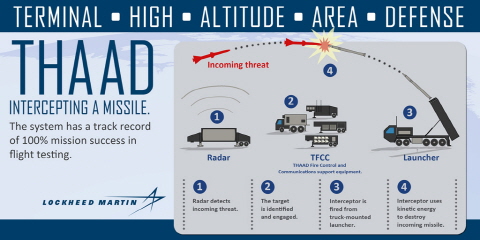
[전문 + mp3] / [받아쓰기]
United States and South Korean officials have announced plans to deploy a U.S. missile defense system to South Korea. The officials said the deployment is to answer North Korea’s nuclear and ballistic missile development programs. General Thomas Vandal is the chief of staff for U.S. Forces in Korea. He and South Korean Deputy Minister of Defense Ryu Je-seung made the announcement in Seoul. Vandal said the two countries had to defend themselves from North Korean weapons. He criticized North Korea’s continued development of ballistic missiles and weapons of mass destruction. The missile system is called THAAD, short for Terminal High-Altitude Area Defense. It can shoot down ballistic missiles before they hit their targets on the ground.
* deploy = (군대, 무기를) 배치하다; 효율적으로 사용하다/ answer = 대응하다, 대답하다/ ballistic missile = 탄도 미사일/ chief of staff = (군대의) 참모총장/ criticize = 비판[비난]하다/ weapon(s) of mass destruction(WMD) = 대량 살상 무기/ short for ~ = ~의 생략[단축](형)인/ Terminal High-Altitude Area Defense = 전구 고고도(高高度) 지역방어/ shoot down = ~을 격추하다
On Friday, North Korea criticized the U.S. and South Korean agreement. China also expressed strong opposition to the planned deployment and urged the U.S. and South Korea to put a stop to it. The Chinese Foreign Ministry said the missile system is not helpful for keeping peace on the Korean peninsula. It also said the deployment will harm the security of countries in the area, including China. In the past, Chinese officials have raised concerns that the THAAD radar system could be used to observe Chinese territory. The U.S. Department of Defense said in a statement that the only weapons to be watched will be North Korean weapons. The Russian government also criticized the planned deployment. It said THAAD will have “irreparable consequences” and will increase tensions in East Asia. South Korea and the United States opened talks about THAAD in February. That followed North Korea’s most recent nuclear test and launch of a long-range rocket. U.S. officials say North Korea has continued to develop its nuclear and missile program in violation of United Nations sanctions. Last month, North Korea launched a partially-successful test of a Musudan missile. That missile flew about 400 kilometers before falling into the sea. But there were signs the North Korean military had or is close to developing the ability to reach U.S. bases in Asia and on islands in the Pacific Ocean. North Korea is believed to have 30 Musudan missiles. The North Koreans also have close to 1,000 other Soviet model missiles. These missiles can reach targets in South Korea and Japan. American officials have said they believe North Korea has enough plutonium to make eight to 12 nuclear weapons.
* opposition to ~ = ~에 대한 반대/ deployment = (군대, 무기의) 배치, 전개/ urge = (…하도록) 강력히 충고하다[설득하려 하다]/ put[give] a stop to ~ = …을 멈추다, 중지[정지]시키다, 끝내다/ keep peace = 평화를 유지하다/ raise concerns (over ~; that ~) = (~에 대한) 우려를 제기하다/ observe = 관찰[관측/주시]하다/ irreparable = [손실・부상 등이] 회복할[바로잡을] 수 없는/ consequence = 결과/ increase tensions (between ~) = (~사이의) 긴장을 고조시키다/ long-range rocket = 장거리 로켓/ in violation of ~ = ~을 위반하여/ sanctions(주로 pl) = 제재/ plutonium = 플루토늄/ nuclear weapon = 핵무기












